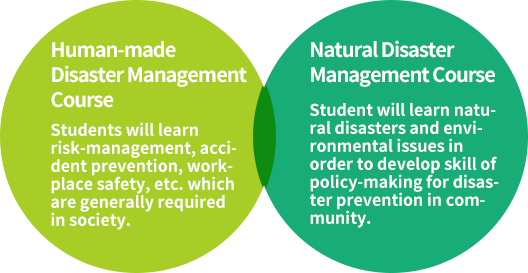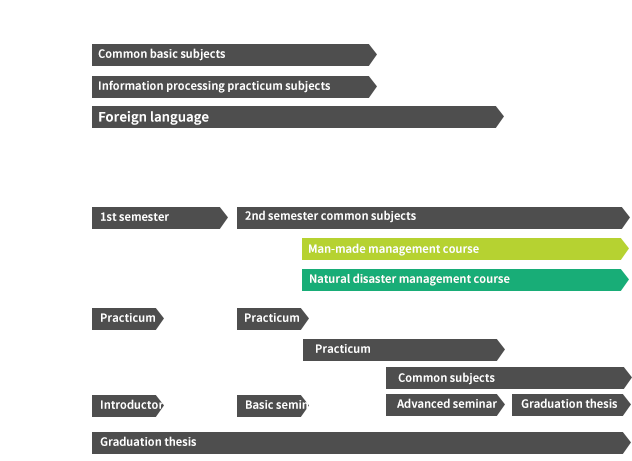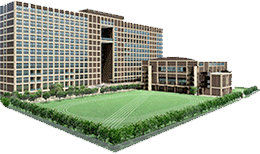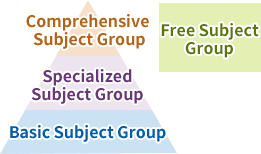- Faculty Overview
- About Faculty of Societal Safety Sciences (FSS)
- Philosophy and Purpose of Establishment
- Curriculum
- Curriculum (For those enrolled before AY 2013)
- Message from the Dean
Curriculum
For those enrolled before AY 2013
Human development through two courses
The Faculty of Social Safety Sciences is intended to develop socially-contributable human resources who can make policies and implement measures for disaster prevention/mitigation, accident prevention, and risk management. In order to realize a society where people can live safely and securely, student will acquire expertise on natural disasters and social disasters, and learn what social system should be established under what kind of institution and policy. Specifically, there are two courses: Natural Disaster Management Course and Man-made Disaster Management Course. The faculty will develop human resources who acquire higher level of expertise and practical skill in their respective field.

-
Modules of Human-Made Disaster Management
Focusing on various accidents and incidents occurred in today’s industrial society, student will learn accident prevention, disaster mitigation, workplace safety, human error, risk management, corporate social responsibility (CSR), safety-related legal system, etc. This course is intended to develop human resources who can play an active role in corporation and society to realize safe and secure society.
-
Modules of Natural Disaster Management
By analyzing mechanism of natural disaster, student will deepen understanding of disaster prevention/mitigation method, how to support disaster victims, how self-help, cooperation and governmental assistance (roles of government, self-responsibility and public policies) should be, and how to establish risk management system. The faculty will develop human resources who can contribute to society as a specialist of disaster prevention/mitigation through safety management.
Concept of Curriculum

Through the 4-year cubiculum, the faculty provides common education in 1st and 2nd year, common education and fundamental advanced education in 2nd year, and advanced education by course in 3rd and 4th year, in principle. The subjects are classified into 4 groups; Basic Program, Advanced Program, Integrated Program, and Free electives. Advanced Program is further divided into 3 courses; Programs Specialized Core Subject, Man-made disaster management course, and Natural disaster management course. Students require 124 units for graduation (necessary unit for graduation) is 124.

Characteristics of the curriculum
The faculty is intended to develop human resources who can make policies for disaster prevention/mitigation, accident prevention and risk-management, and implement them using their acquired theories and tools, not just learn them. In order to achieve this, the faculty educates state-of-the-art expertise regarding safety society. Moreover, the faculty offers higher level of education, by incorporating simulation and practicum. The characteristics of the faculty curriculum are the following 4 points.

- 01
- To systematically acquire the state-of-the-art expertise regarding disaster prevention/mitigation, accident prevention and risk-management
- 02
- To acquire practical skills through hands-on training and practicum including fracture experiment
- 03
- To acquire various skills, such as social research, debates, presentation, advanced information processing and technical English
- 04
- To acquire skill of comprehensively understand situation of natural disaster or accident, and make appropriate policies
For these 4 points, students will acquire knowledge step by step through the curriculum consisting of the above-mentioned subject group; Basic Program, Advanced Program, Integrated Program and Free Electives.
Contents of Program
Basic Program(Common basic subject, Information processing practicum subjects, Foreign language)
Basic program are classified into 3 categories; Common basic subjects, Information processing practicum subjects and Foreign languages. This program includes general educational subjects and introductory subjects which serve a basis of advanced education.
Specifically, these subjects are:
"Introduction to Safety Science I / II", "Introduction to Mathematical Science " ," Practicum in Basic Information Technology I / II", "Contemporary Business ", " Logic" " Elementary Statistics ", " Practicum in Application of Information Technology I / II", "Legal Systems for Safety in Society", "Social Psychology"
These are compulsory subjects because they are extremely important as introduction to specialized subjects. Also, "Ethics," "Modern History," "Contemporary History," "World Geography," "Contemporary International Society" are offered as electives. For Foreign language subjects, there are six languages; German, French, Russian, Spanish, Chinese and Korean as elective foreign languages, in addition to English which is compulsory subject.
Advanced ProgramPrograms Specialized Core Subjects and Course-elective subject (Man-made disaster management course, and Natural disaster management course)
Advance Program which is the core education of this faculty, offers Programs Specialized Core Subjects (common to both courses) and two elective courses (Man-made disaster management course, and Natural disaster management course.)
These include:
“Theories of Risk”, “Probability theory for risk analysis”, “Operating Principles and Structures of Industrial Products”, “Human Activity and Ecology”, “Risk Psychology”, “Disaster Preparedness by Public Institutions”, “Risk Management”, “Risk Economics”, “Industrial Psychology”, “Risk Communication”, “Risk Sociology”, “Safety and Disaster Education”
Also, there are subjects, such as "Advanced English I" and "Advanced English II" where students learn presentation in English and how to write e-mails in English, a subject to deepen understanding of current situation of safety issues, and a subject to learn theories and countermeasures for problem-solving. This program is well balanced between humanities/social science and natural science.
Integrated ProgramPracticum subjects, Common subjects, Seminars
Integrated Program is a subject group which develops a skill of comprehensively integrate individual specialized subjects, and the Program consists of 3 categories; "Practicum subjects," "Common subjects" and "Seminars.”
"Practicum subjects" include "Social safety practicum I" (compulsory for 1st year) and "Social safety practicum II" (compulsory for 2nd year) that use outside facilities. As "Seminars,” "Introductory seminar" (1st year), "Basic seminar" (2nd year), "Advanced seminar" (3rd year), and "Graduation study" (4th year) are available.
Free elective subjects
In addition, free elective subjects, such as the subject to acquire the teaching license of junior high school type I (Society) and high school type I (Civics), as well as internship are available.
Curriculum
It is a curriculum for the purpose of forming ability, that we will learn interdisciplinary and complex from both natural sciences, humanities and social sciences, in fields related to disaster prevention / reduction, accident prevention, crisis management, and contributes to the realization of a safe and secure society by fusing and developing them. While conducting education and research on social safety in general, we will acquire basic knowledge and methods, especially with respect to natural disasters such as earthquakes and floods and social disasters centering on accidents. We will also conduct learning aimed at improving English communication skills.
- Basic Programs
-
First Year Second Year Third Year Fourth Year Compulsory Subjects ■Introduction to Safety Science I ■Introduction to Safety Science II ■Legal Systems for Safety in Society ■Contemporary Business ■Introduction to Mathematical Science ■Social Psychology ■Logic ■Elementary Statistics ■Modern History ■Contemporary International Society ■World Geography ■Contemporary International Society ■Theory of Legal Systems ■Public Administration ■Introduction to Economics ■Introduction to Business Management ■Philosophy ■Ethics ■Psychology ■History of Technology and Engineering ■Natural Environment ■Introduction to Geophysics ■Constitution of Japan ■Basic Physical Education I ■Basic Physical Education II ■Career Design I (Work Career and Life Career) ■Takatsuki City and Kansai University ■Study of Health-Sports Science ■Career Design II (Job and Working World) ■Career Design III(Career Decision Making) Information Processing Practicum Subjects ■Practicum in Basic Information Technology I ■Practicum in Basic Information Technology II ■Practicum in Application of Information Technology I ■Practicum in Application of Information Technology II Foreign Language ■English I a ■English I b ■English II a ■English II b ■German I a ■German I b ■German II a ■German II b ■French I a ■French I b ■French II a ■French II b ■Russian I a ■Russian I b ■Russian II a ■Russian II b ■Spanish I a ■Spanish I b ■Spanish II a ■Spanish II b ■Chinese I a ■Chinese I b ■Chinese II a ■Chinese II b ■Korean I a ■Korean I b ■Korean II a ■Korean II b ■Advanced Foreign Language (English I a) ■Advanced Foreign Language (English I b) ■Advanced Foreign Language (English II a) ■Advanced Foreign Language (English II b) ■English III a ■English III b ■English IV a ■English IV b ■Advanced Foreign Language (English III a) ■Advanced Foreign Language (English III b) ■Advanced Foreign Language (English IV a) ■Advanced Foreign Language (English IV b) ■English V a ■English V b ■English VI a ■English VI b ■Advanced Foreign Language (English V a) ■Advanced Foreign Language (English V b) ■Advanced Foreign Language (English VI a) ■Advanced Foreign Language (English VI b) ■Overseas Training (Each Seminar) ■Authorization of Certification 1 (Each Certification Examination) ■Authorization of Certification 2 (Each Certification Examination) ■Authorization of Certification 3 (Each Certification Examination) Subjects for Foreign Students ■Japanese I a ■Japanese I b ■Japanese II a ■Japanese II b ■Japanese III a ■Japanese III b ■Contemporary Japan I ■Contemporary Japan II ■Japanese IV a ■Japanese IV b ■Japanese V a ■Japanese V b ■Japanese VI a ■Japanese VI b Green Letters: Compulsory Subjects
- Advanced Program
-
First Year Second Year Third Year Fourth Year Common Specialized Subjects ■Risk Theory ■Probability Theory for Risk Analysis ■Mechanism and Characteristics of Artifacts ■Human Activity and Ecosystem ■Health Risk Studies ■Risk Economics ■Risk Sociology ■Risk Psychology ■Industrial Product Safety ■Natural Disaster History ■History of Urban Structures ■Urban and Regional Safety ■Danger and Safety of Life ■Safety Education ■Social Investigation Method ■Social Psychology Experiment Method ■Environmental Law Policy ■Safety-related Laws ■Public System of Anti-disaster Measures ■Science Technology and Ethics ■Industrial Psychology ■Public Utility ■Crisis Management and Leadership ■Corporate Ethics ■Corporate Social Responsibility ■Insurance ■Risk Management ■Risk Communication ■Sociology of Safety and Security ■Psychology of Security and Trust ■Mathematics of Planning and Management ■Environmental Risk ■Resources and Energy ■Specialized English I ■Specialized English II Social Disaster Management Course ■Compliance ■Accident Liability ■Accident Investigation System ■Food Safety and Hygiene ■Public Health ■Drug Development and Safety ■Transportation System ■Nuclear Plant Safety ■Crime Deterrence ■Information Security ■Human Error ■Mental Health ■Consumer Safety Act ■Occupational Safety and Health ■Public Traffic Safety Management ■Crisis Management ■Human Error and Traffic Accident ■Disaster Victim Psychology ■Epidemic Control Science ■Accident Simulation ■Chemical Plant Safety Natural Disaster Management Course ■Administrative Law ■Local Administration ■Local Finance ■Firefighting Disaster Prevention Administration ■Economics of Disasters ■Urban Disaster Measures ■Earth Disaster Prevention ■Earthquake Disaster ■Global Environmental Issues ■Meteorological Disaster Studies ■Regional Disaster Prevention Psychology ■Urban and Regional Disaster Prevention Studies ■Logistics ■Disaster Recovery ■Disaster Relief and Support ■International Development of Disaster Education ■Disaster Prevention and Crisis Management ■Fire Disaster ■Environmental Policy ■Disaster Simulation Green Letters: Compulsory Subjects
- Integrated Program
-
First Year Second Year Third Year Fourth Year Practicum ■Social Safety Experience Practice I ■Social Safety Experience Practice II ■Social Safety Practice (disaster investigation) ■Social Safety Practice (social research) ■Social Safety Practice (disaster experiment) ■Social Safety Practice (social psychology experiment) Common Subjects ■Outline of Engineering ■Social Technology ■Thought of Safety ■Advanced Disaster Recovery Issues ■Disaster Case Analysis ■Accident Case Analysis ■Theme Study I ■Theme Study II Training Subjects ■Introductory Exercise ■Basic Practice ■Specialized Practice ■Graduation Research Green Letters: Compulsory Subjects
- Free elective subjects
-
First Year Second Year Third Year Fourth Year ■Outline of Japanese History a ■Outline of Japanese History b ■Outline of Teaching Profession ■Education Principle ■Library Material ■Oriental History ■Western History ■Geography a ■Geography b ■Geography Outline a ■Geography Outline b ■Education System ■Human Rights Education -Focusing on Buraku Liberation Education- ■Educational Psychology ■Social Studies Education Method (1) ■Social Studies Education Method (2) ■Civil and Community Education Method (1) ■Civil and Community Education Method (2) ■Moral Education Research ■Extra-Curricular Activities ■Educational Methods and Techniques ■Educational Counseling ■Information Resource Organization Outline ■School Management and School Library ■Learning Instructions and School Library ■Reading and Rich Humanity ■Utilization of Information Media ■Curriculum Development ■Social Studies Education Method (3) ■Social Studies Education Method (4) ■Students Career Guidance ■Teaching Practice Pretraining ■Teaching Practice (1) ■Teaching Practice (2) ■Teaching Practical Exercise (intermediate) Internship (each institution) Specialized Subject Group